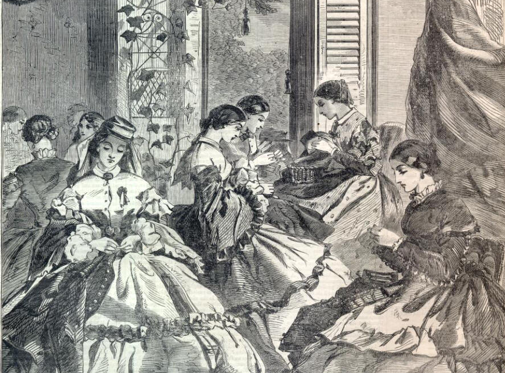
Name: Harriet Tubman, Pauline Cushman, others
Occupation: Spies, soliders, etc.
Location: United States of America, 1861-1865
War history is often full of the exploits of brave, white men. History books document the movements of generals, actions of presidents and prime ministers, and occasionally mention a brave foot soldier or two who fought valiantly for the cause. While that’s all well and good, this kind of history leaves out some of the most quintessential historical actors: women. A great example of this oversight is the story of the American Civil War, taught as a battle between the brave North and backwards South, over the bodies of enslaved black plantation workers. It’s time, I think, to bring to light the stories of Civil War Era women, particularly African American women, who did more than twiddle their thumbs while war waged in America.
The first and most famous of these women is Harriet Tubman. Best known for being a conductor on the Underground Railroad, she led more than 300 slaves, including her parents, to freedom in the North. Few know that Tubman also was the first woman in the history of the US to lead a military expedition. She was also charged by the Union to create a network of spies in South Carolina, consisting primarily of former slaves. On June 1, 1863, Tubman lead several hundred black soldiers up the Combahee River to the shore of a Confederate supply depot. There they destroyed the port and freed more than 750 slaves.
Mary Elizabeth Bowser, though not nearly as famous as Tubman, also took part in war-time action. She assisted her mistress, Miss Elizabeth Van Lew (who secretly freed Bowser after the death of her father in 1843) in carrying messages between imprisoned Union soldiers and the outside world. Van Lew, Bowser, and a network of former slaves and Unionist allies brought medicine, food and books to the prisoners. They even helped some prisoners escape. Like many African American women, Bowser’s story has been mostly lost to time, but there is a record of an address she gave in 1865. In it, she claimed to have taken part in anti-Confederate wartime actions, and that she had infiltrated the Confederate White House during the war.
Other spies include Pauline Cushman, a struggling white actress who was asked to perform a toast to Jefferson Davis by a gang of drunk Confederate soldiers. She used the opportunity to contact Union marshals and become a Union intelligence operative. But not all spies worked for the Union. Belle Boyd was a Confederate spy who shot a Union soldier at the age of 17. She used her charm and wealth to persuade Union soldiers to give her information, which she passed along to the Confederacy. Boyd became a courier between Confederate generals ‚ÄúStonewall‚Äù Jackson and P.G.T. Beauregard. She was arrested multiple times by Union forces. Other Confederate spies included Rose O’Neal Greenhow and Antonia Ford, who gathered information from locally stationed Union soldiers and passed it on to Confederate generals.
All these women played an essential role in history, and yet have been systematically ignored by historians. Though we’ve lost many of the stories of the accomplishments of Civil War era women, it is essential we remember the few women whose names have not been lost. Their legacies deserve to live on beside the triumphs of Robert E. Lee and Stonewall Jackson.
-Rebecca Valley
Junior Girl
Girl Museum, Inc.
